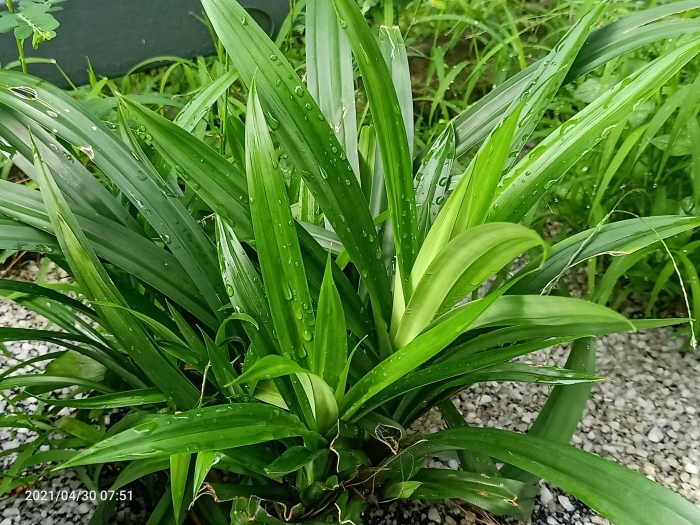Pandan
(Pandanus amaryllifolius)
Pandan (Pandanus amaryllifolius)
/
/

© Ong Jyh Seng
CC BY-SA 4.0
Image By:
© Ong Jyh Seng
Recorded By:
Copyright:
CC BY-SA 4.0
Copyright Notice:
Photo by: © Ong Jyh Seng | License Type: CC BY-SA 4.0 | License URL: http://creativecommons.org/licenses/by-sa/4.0/ | Uploader: ongzi | Publisher: iNaturalist |

















Estimated Native Range
Summary
Pandanus amaryllifolius, commonly known as pandan, is a tropical perennial herb that is highly valued in Southeast Asian cuisine for its aromatic leaves. Although it is often stated that pandan was domesticated from the Maluku islands, its precise native habitat is not well-documented due to its ancient cultivation and the absence of truly wild populations. It is typically found in home gardens and cultivated landscapes throughout the tropics, thriving in warm, humid conditions.
Pandan is a key ingredient in many Asian dishes, imparting a unique, sweet fragrance to rice, desserts, and drinks. The plant has a clumping growth habit with long, narrow, blade-like green leaves that can be used fresh or dried. It is sterile and propagates through cuttings, making it easy to maintain and share among gardeners. In addition to its culinary uses, pandan leaves are reputed to have antibacterial and antifungal properties and are often used in traditional medicine. They are also popular as natural air fresheners due to their pleasant scent. Cultivation of pandan requires consistently moist, rich soil and a tropical climate, with protection from strong winds. It prefers partial shade but can tolerate full sun if kept well-watered.CC BY-SA 4.0
Pandan is a key ingredient in many Asian dishes, imparting a unique, sweet fragrance to rice, desserts, and drinks. The plant has a clumping growth habit with long, narrow, blade-like green leaves that can be used fresh or dried. It is sterile and propagates through cuttings, making it easy to maintain and share among gardeners. In addition to its culinary uses, pandan leaves are reputed to have antibacterial and antifungal properties and are often used in traditional medicine. They are also popular as natural air fresheners due to their pleasant scent. Cultivation of pandan requires consistently moist, rich soil and a tropical climate, with protection from strong winds. It prefers partial shade but can tolerate full sun if kept well-watered.CC BY-SA 4.0
Plant Description
- Plant Type: Shrub, Herb
- Height: 3-8 feet
- Width: 3-8 feet
- Growth Rate: Moderate
- Flower Color: Green, White
- Flowering Season: Spring
- Leaf Retention: Evergreen
Growth Requirements
- Sun: Full Sun, Part Shade
- Water: Medium
- Drainage: Medium
Common Uses
Edible*Disclaimer: Easyscape's listed plant edibility is for informational use. Always verify the safety and proper identification of any plant before consumption., Fragrant, Low Maintenance, Potted Plant
Natural Habitat
Cultivated landscapes throughout the tropics
Other Names
Common Names: Fragrant Pandan , Screw Pine
Scientific Names: Pandanus amaryllifolius , Pandanus hasskarlii , Pandanus latifolius , Pandanus latifolius var. minor , Pandanus odorus
GBIF Accepted Name: